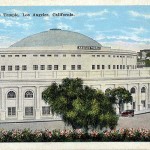This is the anniversary of The King’s death. I’ve been to Graceland, and I must say that aside from the garishness of it all, it was moving to see the reverence folks have for him. Most people know that Elvis had a religious background, and even recorded some pretty good gospel albums, what most do not know was that Elvis was a member of the Assemblies of God, and in his youth, was even an Ambassador for Christ–the Assemblies’ youth ministry. In fixing up a long awaited chapter I am working on that features Elvis prominently, I could not help but notice that like many African American cross over stars, who began their musical careers in church and eventually began playing the “devil’s” music only to be shunned by their church folk, Elvis, too is the Pentecostal nobody knows about–or rather, the Pentecostal that the Assemblies would want you to forget.
At the height of his popularity, the 1950s through the early 60s, Elvis barely elicits a mention in the pages of the official magazine of the Assemblies, the Pentecostal Evangel. Even though, from what I can tell, Elvis never denied being Pentecostal, and even became quite annoyed when asked a question about “holy rollers” he found to be more mocking than inquisitive–in public at least, Elvis spoke quite respectfully of his church experience as a young man. Elvis, like dozens of African American musicians, was guilty of leaving the fold–of using his God-given talents to promote the “enemies'” agenda: promiscuity, dancing, and who knows what else!
The Assemblies did promote Jimmy Snow, a fellow musician who played with Elvis, but soon saw the error of his ways and converted to Pentecostalism, becoming one of the Assemblies of God showcase evangelists in their ongoing culture war against rock music (a war, they were destined to lose, given the fact that aside from a few select outposts in Pentecostal culture, are records burned anymore). But Elvis, who did not repent, who became THE iconic image of rock music for decades and still is capable of gathering thousands of people yearly on a pilgrimage to his home and burial place in Memphis, became bigger than the old tired sacred/secular musical divide. Elvis, who at the same time, attended Ambassadors for Christ youth rallys, also snuck out of Sunday services with his girlfriend to attend the Church of God in Christ service, where his love of African American gospel and blues stoked his interest in African American music–to the point where for decades after, Elvis was the most popular interpreter of African American musical styles–bringing those styles to a global audience.

Perhaps an unspoken but fairly obvious reason why Elvis was persona non grata in the constellation of stars the Assemblies promoted as their own, was that Elvis, a poor Southern white man, was in love with black music–unapologetically so. When asked whether the African American influence of Elvis’s music was something that he may have learned at an Assemblies church, an Assemblies pastor retorted that that the reporter’s question was so stupid, it was not worthy of a response. Southern Assemblies of God churches in the 1950s and 60s were not bastions of racial tolerance, and in fact, seemed to revel in their homogenous whiteness and in the untainted nature of their white Southern gospel tradition. Elvis didn’t learn that music in our churches–we don’t do that. As Elvis became the icon he still is and spiritually moved on to incorporate elements of Eastern philosophy, especially the teachings of the Self-Realization Fellowship, he never really left his Pentecostal upbringing behind–though he never exhibited the full-fledged repentance that the Assemblies would have wanted from from him in order for him to become acceptable.
In 1960, Elvis released his first gospel album, His Hand In Mine, a collection of standards that should have made his Assemblies brethren very happy. But there is no mention of Elvis’ gospel music, but there are lots of mentions throughout the 60s in the pages of the Pentecostal Evangel of how rock music will lead to moral depravity, juvenile delinquency, and open the spiritual doors to all kinds of ungodly influences from Eastern religions, which in the 1960s, were, and to a great degree, are still viewed as little more than exotic paganism by most Pentecostals. And, the Assemblies, throughout the 60s, was still advocating burning records–advertising such events with the infamous Rev. Bob Larson (who’s still at it!). By the end of the 60s, Elvis was past his prime, readying himself for a “comeback” t.v. special in 1968, with a few more hits to follow before his sad decline into drug abuse and his premature death on August 16, 1977. By the end of the 60s, the Assemblies of God, after having denounced space travel and exploration as ungodly and undoable–featured a crudely drawn space man on the cover of their 1969 magazine–lauding the moon landing as an event of divine proportions. Not to worry, the AG continued to denounce rock music–even holding record burnings on occasions with the help of deliverance minister extraordinare, Bob Larson. Since music is now delivered digitally, one wonders where the fire will be next time?
(In an attempt to find out what Pentecostals are doing to protect themselves from rock music, I did a quick 5 minute web search, but stopped when the first site was a page long post on the evil that is Beyoncé–okay, maybe the hair.
Next time, a guest post from my hermana, Erica Ramírez

















